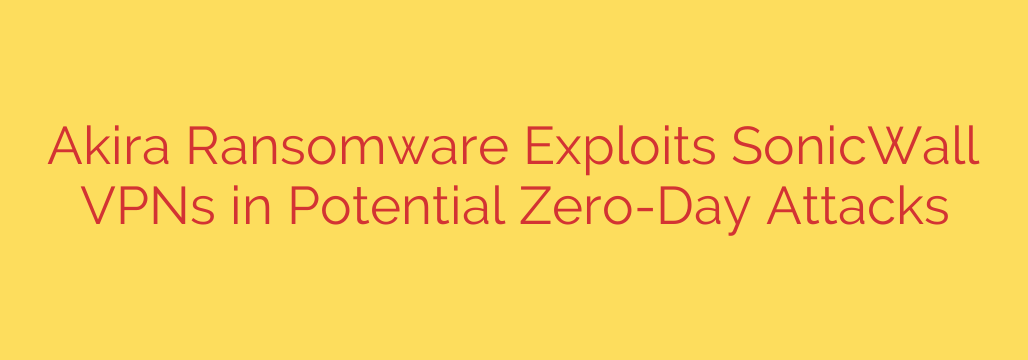
Warning: Akira Ransomware Exploits SonicWall VPNs in Zero-Day Attacks
A sophisticated ransomware group known as Akira is actively targeting businesses by exploiting critical vulnerabilities in SonicWall Secure Mobile Access (SMA) 100 series VPN appliances. Security experts warn that these attacks are leveraging a potential zero-day vulnerability, meaning a flaw previously unknown to the manufacturer and for which no official patch currently exists.
This campaign represents a significant and immediate threat to any organization relying on these devices for secure remote access. The attackers have demonstrated the ability to compromise networks, steal sensitive data, and deploy ransomware, causing widespread operational disruption.
The Critical Threat: Bypassing Multi-Factor Authentication
One of the most alarming aspects of this attack is the method used by the Akira group. Evidence suggests that the attackers are successfully bypassing multi-factor authentication (MFA) protocols on unpatched or vulnerable SonicWall VPNs. Many organizations consider MFA a cornerstone of their security posture, making this development particularly concerning.
The exploit appears to allow threat actors to use stolen credentials to gain initial access to a corporate network without being challenged by a second authentication factor. This tactic effectively negates a critical layer of security, leaving networks exposed to unauthorized entry. The credentials themselves may have been acquired through earlier phishing campaigns or from dark web marketplaces.
Once inside the network, the attackers follow a familiar and destructive pattern:
- Lateral Movement: They move discreetly through the network to identify high-value targets like servers and data backups.
- Data Exfiltration: Before encrypting files, they steal large volumes of sensitive corporate data.
- Ransomware Deployment: Finally, they deploy the Akira ransomware, encrypting essential files and demanding payment for their release.
This “double extortion” strategy puts immense pressure on victims, who must not only worry about restoring their systems but also face the threat of having their confidential data leaked publicly.
How to Protect Your Organization Immediately
Given the active exploitation and the potential zero-day nature of this vulnerability, immediate action is required to mitigate the risk. If your organization uses SonicWall SMA 100 series appliances, consider these security measures essential.
1. Isolate and Update Your Devices
While a specific patch for this zero-day may not yet be available, it is crucial to ensure your SonicWall devices are running the latest possible firmware version. Vendors frequently release updates that can address related security weaknesses. If immediate patching is not possible, consider taking the appliance offline or severely restricting access until it can be secured.
2. Reset All VPN-Related Credentials
Because the attack relies on stolen credentials, it is imperative to immediately reset the passwords for all accounts that have access to the VPN. This includes service accounts and administrator credentials. Enforce strong, unique passwords for all users to prevent easy credential stuffing attacks.
3. Enable and Scrutinize Logs
Turn on and actively monitor logging for your SonicWall VPN appliances. Look for any signs of suspicious activity, such as logins from unusual geographic locations, multiple failed login attempts from a single IP address, or logins at odd hours. These logs are your best tool for early threat detection.
4. Strengthen Network Segmentation
Proper network segmentation can be the difference between a minor incident and a catastrophic breach. By isolating your critical systems from the rest of the network, you can prevent attackers from moving laterally even if they breach the initial perimeter. Ensure that a user logging in through the VPN does not have unrestricted access to every part of your network.
5. Review Your Incident Response Plan
This attack serves as a stark reminder that even robust defenses can be bypassed. Ensure your incident response plan is up-to-date and that your team knows precisely what steps to take if a breach is detected. A well-rehearsed plan can significantly reduce the impact and recovery time of a ransomware attack.
The evolving tactics of groups like Akira highlight the constant need for vigilance in cybersecurity. Proactively managing vulnerabilities and hardening security controls are no longer optional—they are fundamental to business survival.
Source: https://securityaffairs.com/180724/cyber-crime/akira-ransomware-targets-sonicwall-vpns-in-likely-zero-day-attacks.html








